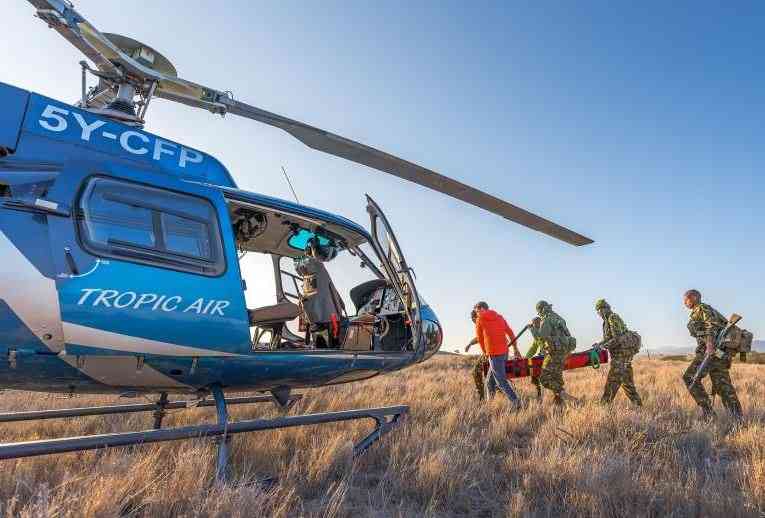
Jamie Roberts, the founder of Nanyuki-based Tropic Air does not enjoy being in the limelight. He would rather deflect any accolades to the rest of his team, but is gracious when pinned down for an interview.
And although he admits it modestly, his heroic exploits with the aviation company he started 30 years ago have gained global acclaim.
We met Jamie last Sunday at the Burney's Restaurant located at the Nanyuki Airstrip.
Our meeting was supposed to have taken place the previous day, but the life of an aviator can turn upside down by the second.
I am in the company of Ann Kanini and a photographer, both from the Kenya Tourism Board who were in the area to find ways of enticing Kenyans with the vast holiday hotspots around Nanyuki.
"If Jamie said he will come, he will. Let's be patient," she assures me as minutes go by. "In fact, let us get some more coffee."
A few sips in, Jamie appears, his pet dog in tow. He does not look like your typical pilot. No white shirts, no tie or those dark trousers synonymous with aviation geeks. With his trademark silver beard, a casual shirt, khakis and hiking boots, it is as easy like a Sunday morning for Jamie.
But Tropic Air, the outfit that he leads works like a well-oiled machine.
- Digital detox tourism: What you need to know
- To recline or not to recline your seat?
- Magical adventure to the heart of Kerio Valley
- Packing a carry-on bag like a pro
Keep Reading
It operates in some of the most inhospitable locations within East and Central Africa, including the Danakil Depression in Ethiopia, one of the hottest places on earth due to volcanos, Sulfur springs, geysers, and endless salt pans. It is also one of the lowest points on earth, at 500 feet below sea level.
Still, his most frightening episode was landing in between matatus at Nairobi's Globe roundabout with a filming crew only to be surrounded by menacing young men.
"I thought they will strip my chopper for scrap metal," he says. He took off without an incident.
Mount Kenya, looming several kilometres away from the airstrip, is an aviator's nightmare. Few would dare fly at close proximity with the second highest peak on the continent.
But this is where Jamie and his team, all safety factors considered, will fly to either evacuate stranded hikers, put out fires, rescue stray or injured elephants or restock trout at some of the lakes around the mountain.
In August 2012, the company was in the frontline during the evacuation of Ugandan soldiers whose Russian -made Mi-24 combat helicopters crashed on the mountain while enroute to Somalia to fight the Al Shabaab insurgents.
"The region is harsh, not in terms of safety, but on our equipment. We either land on sand or dust, but our maintenance facility is equal to the task," says Jamie.
Although their commercial services are not the cheapest due to operational costs, conservation rates are lower than normal charter fees. In addition, the company has done a number of search and rescue operations pro bono.
"I once went to Mt Kenya for a rescue mission only to find a porter who had been hit by a rock while making a technical climb. His boss came and asked me how much it would cost him. I said Sh400,000. He looked at me in shock and I told him, 'I will charge you nothing as long as you train your porters'. Now most of these potters are well trained and such rescue missions have reduced," says Jamie.
Locally too, his work with medical teams has given hope to thousands in remote parts of Kenya who would otherwise have died of treatable conditions.
He recalls a medical campaign among the Gabbra people in Kalacha, Marsabit sometime back. Cataracts had infected a number of men and scenes of women leading their almost blind husbands were the norm.
"After the operation, the man, who had not seen his wife for 30 years exclaimed, 'Oh, we have gotten old'. A girl who was blind all her life could see again. Friends asked her about colours, but she had never seen any colour in her life. It made me cry," he says.
Their custom-built helicopter safaris have become the choice for high-spending tourists who include members of the royal family, movie and sports stars, and other global figures.
From breakfasts in the mountain to sundowners in the deserts, Jamie and his team have upped the ante as far as aerial tourism is concerned.
Would he give any snippets into some of the notable figures? "No, we can't talk about them though we are fortunate they choose to have our company fly them around," he says, alluding to non-disclosure agreements with such high-flying guests. "But I can tell you this, we are fortunate as a country to have the different-themed tourism hotspots all accessible in a day. Where else can you have some coffee near the snow at 17,000 feet and an hour later, a cold drink in a desert?"
This vaunted beauty came to the fore when the company was shooting for the popular television commercial by the telco Safaricom during their tenth anniversary. The opening scene was from Mt Kenya while other portions were shot in some of the most picturesque locations in the country. "Some who saw the production said it looked all very nice if only it was in Kenya. But it was," he says. "I have flown everywhere, but Kenya is a beautiful country."
"But where did all this begin?" I ask him. He pauses to allow the roar of a departing Twin Otter die off.
"It was in 1990 and there was nothing in the airfield here apart from a patchy, overgrown tarmac and a nondescript caretaker's hut. I started off with a small Cessna 206 to ferry tourists who would land here with another local operator but who would otherwise drive four or five hours into the camps and lodges. That is how Tropic Air was born," says Jamie.
From the small plane, the fleet has grown to include a dozen fixed wing aircraft, including the all-terrain Cessna Grand Caravan, five Airbus H125 (AS350B3) and an Airbus H130. The staff has also grown to 70.
Jamie was born in Nakuru, with the family settling in Baringo's Kampi Ya Samaki where they operated a fish factory and where he was brought up by his mother together with five other siblings. His father had died when he (Jamie) was three years old. His grandparents had a small farm in Limuru, but their business plan did not work out. "They died poor because they were hoping to make money through the farming of a crop to extract essential oils. It was a good idea whose time had not come." At a flying club in Nakuru, Jamie learnt how to fly the fixed wing aircraft before 'graduating' to helicopters 30 years later.
His move to Nanyuki to establish the business was a boon to the local tourism industry as more lodges began to be built opening up the region to both local and global tourism.
"There were about three key lodges in Laikipia when we started. Lewa, Ol Malo, Loisaba, and perhaps a few other small ones. We would also fly people to Turkana and into the Chalbi Desert for camping safaris. Today, there are several dozen lodges, many with their own airstrips where we can fly to. The area is more accessible today," he says.
During the 60s, the local airstrip was located on a grassy patch along the Nanyuki-Rumuruti Road. In the 70s, the property was purchased by the military who set up Laikipia Air Base, with the civilian operations moving to the present-day location along the Nanyuki-Naromoru Road.
Operating in the often-hostile northern Kenya has its security challenges, but Jamie and his team navigate safely "because we know the people here", the blue-coloured helicopters being regular sights in the volatile north.
Generally, though, Kenyans are welcoming, according to Jamie, unlike other regions "where people are aggressive first and friendly last".
However, Jamie decries the high cost of doing business in Kenya. He says: "You have to import a helicopter for $3 million, but then you have to add a 48 per cent tax on top. That is why there are fewer new helicopters in Kenya. You will not find me flying my family around in one of the choppers either. It is expensive."
Running a private aviation company may be an expensive affair in Kenya, but for Jamie, the sky is still not the limit.
 The Standard Group Plc is a multi-media organization with investments in media
platforms spanning newspaper print
operations, television, radio broadcasting, digital and online services. The
Standard Group is recognized as a
leading multi-media house in Kenya with a key influence in matters of national and
international interest.
The Standard Group Plc is a multi-media organization with investments in media
platforms spanning newspaper print
operations, television, radio broadcasting, digital and online services. The
Standard Group is recognized as a
leading multi-media house in Kenya with a key influence in matters of national and
international interest.









